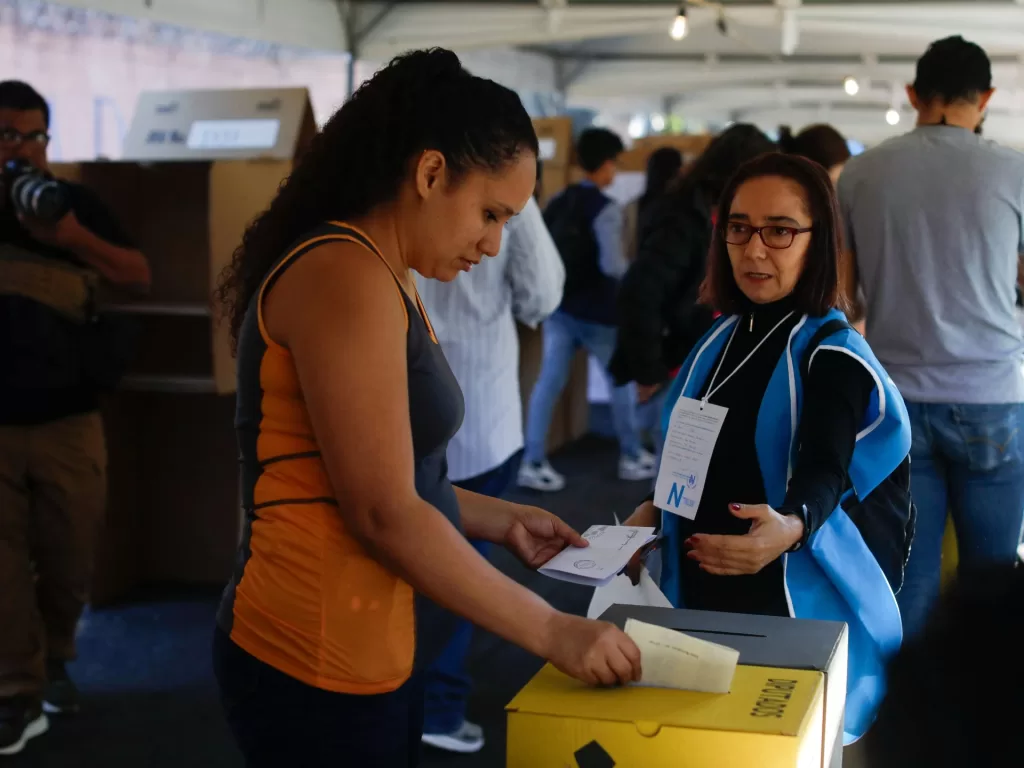The country is voting in both presidential and legislative polls; incumbent Bukele faces virtually no competition.
With soaring approval ratings and virtually no competition, President Nayib Bukele is almost certainly headed for a second term.
For the first time since civil war ended in 1992, the Central American country will vote under a state of emergency imposed for Bukele’s gang crackdown that slashed homicide rates but drew criticism for human rights violations.
Bukele, who polls as Latin America’s most popular leader, is also expected to expand his hold over the Legislative Assembly of El Salvador in Sunday’s elections.
An estimated 69.9 percent of voters approve of his re-election bid, despite questions about its constitutionality: Before Bukele, presidents in El Salvador had historically been limited to one term.
With little need to campaign for himself, Bukele focused on promoting his Nuevas Ideas party, which holds 56 seats in the 84-member assembly.
The overall number of seats has been reduced to 60 under a reform he led, which critics say will make it much harder for smaller parties to get enough votes to get in.
In 2022, the legislature also approved a law allowing Salvadorans to vote abroad. Under that reform, all foreign ballots – which tend to favour Bukele – will count towards the department of San Salvador, which has the most undecided seats, according to the Washington Office on Latin America, an NGO promoting human rights.
Alternating in power for some three decades, the conservative Nationalist Republican Alliance (ARENA) and leftist Farabundo Marti National Liberation Front (FMLN) were discredited for corruption and inefficacy. Their presidential candidates have been polling in the low single digits.
‘Unwaveringly loyal’
Bukele, who often spars with foreign leaders and foes on social media, came to power in 2019, trouncing El Salvador’s traditional parties with a vow to eliminate gang violence and rejuvenate the stagnant economy.
He has campaigned on the success of his draconian security strategy that saw authorities suspend civil liberties to arrest thousands of suspected gang members without charge. The detentions led to a collapse in nationwide murder rates and transformed the poor Central American nation that was once among the world’s most dangerous.
“I would vote for Bukele because of the work he has done so far,” Juan Carlos Rosales, 44, a systems engineer in the capital San Salvador told the Reuters news agency. “The improvement in security is palpable.”
Still, despite Bukele’s solid base, some analysts question how long voters will back his strongman approach, particularly as more people feel its sting.
Under his rule, El Salvador has one of the highest incarceration rates in the world, with an estimated two percent of its adult population behind bars.
Bukele has credited his “mano dura” or “iron fist” tactics for causing that number to tumble to just 7.8 homicides out of every 100,000 people — the lowest in Central America.
Rights groups have warned El Salvador’s democracy is under attack.
Bukele has largely dismissed those concerns, at one point changing his profile on X, to say: “World’s coolest dictator”.
His biggest challenge is the state of the economy, Central America’s slowest growing during his time in power. More than a quarter of Salvadorans live in poverty.
The International Monetary Fund, which is negotiating a $1.3bn bailout with El Salvador, in late 2023 described the country’s fiscal situation as “fragile”.
In a post on X this week, Bukele pledged to bring about changes. “There is still a huge amount to do,” he said, “but, step by step, we will resolve entire decades of looting and neglect.”
